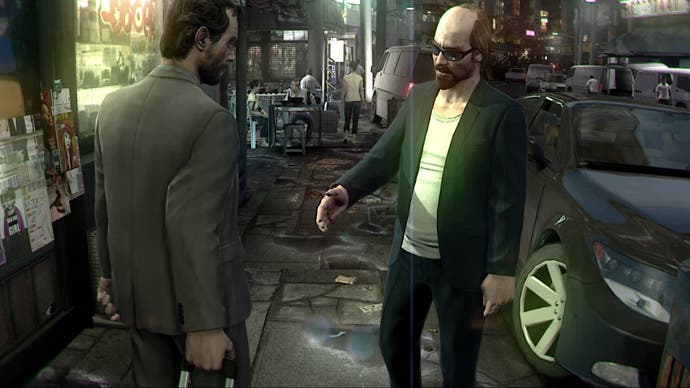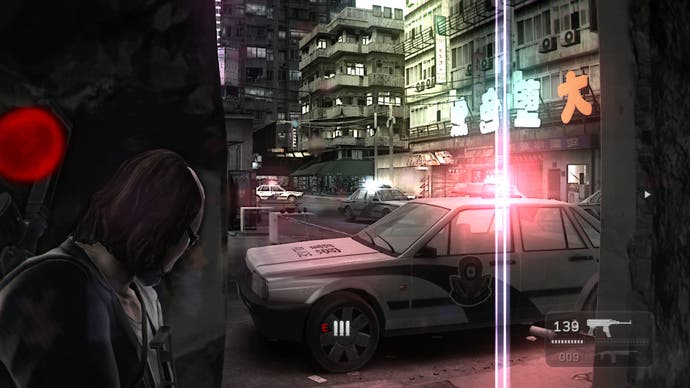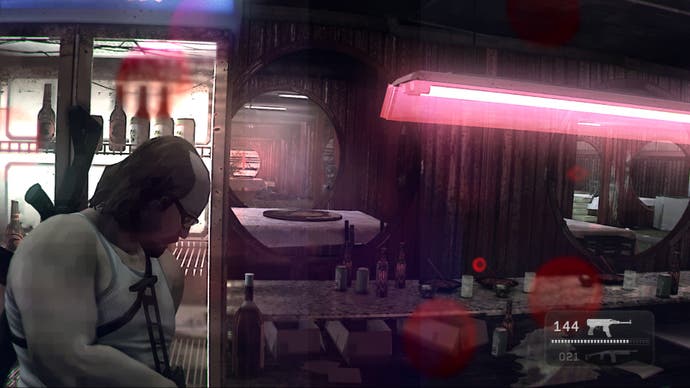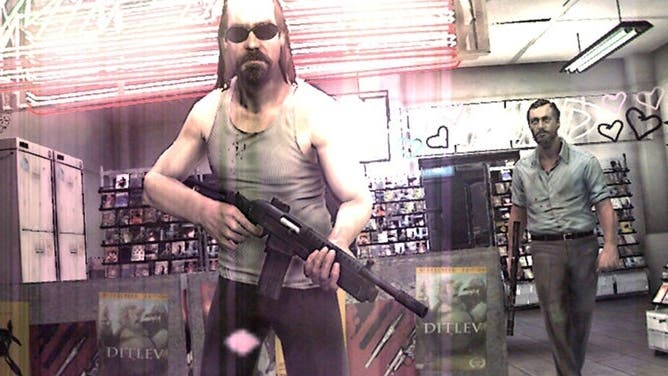Kane & Lynch 2 is nasty, pointless, and well worth playing
Every dog has its day.
Kane & Lynch 2 is an ugly game in almost every sense. It's aesthetically ugly, it's thematically ugly, it's even mechanically ugly, a clumsy and chaotic third-person shooter with a sticky cover system and AI thicker than asbestos soup. What's interesting about it all, though, is that most of this ugliness (although admittedly not all of it) is deliberate, in what is a fascinating example of a developer exploring its own mistakes and mishaps through another creative work.
The original Kane & Lynch (subtitled Dead Men) was a third-person shooter inspired by cinematic crime-epics such as Michael Mann's Heat. It followed two aspiring bank-robbers, the misanthropic Kane and the psychotic Lynch, who were notable mainly for their peculiar talent for screwing things up. Unfortunately, the game turned out to be profoundly mediocre, featuring bland presentation, nondescript cover shooting, and a story that relied too heavily on the better work of other artists to really stand out.
Most developers would have quietly left the dysfunctional duo in virtual purgatory, but IO interactive instead decided that Kane & Lynch deserved a second chance. Rather than expanding and refining the concept of the previous game, however, IO went about elaborating upon all its worst elements - the clunky combat, the hollow story, and the ugly aesthetic. What results, weirdly, is a far more interesting game than its predecessor.

Kane & Lynch 2 takes place in Shanghai, and sees Lynch invite Kane to China to help him negotiate an arms deal set up by a crime-boss named Glazer. Before heading to the deal, however, Lynch decides to collect a debt from a local gangster, an event that goes awry and causes a chain reaction that ripples from Shanghai's criminal underworld right up into the heart of the city's political infrastructure. The action is relayed to us from the perspective of a handheld camera, although the game doesn't explain who is holding the camera or why Kane and Lynch let themselves be filmed engaging in increasingly atrocious gunfights.
What is clear is that it must be the worst handheld camera ever manufactured. Many games render their worlds as if viewed through a lens, depicting camera artefacts like lens-flare, motion-blurring, and chromatic aberration in a misguided pursuit of graphical realism. Kane & Lynch 2 takes this idiosyncrasy and turns it into a deliberate aesthetic, one which actually makes the game look less attractive. The colour contrast is horrible, washing out muted colours almost to monochrome, and rendering bright colours such as neon-signs with migraine-inducing glare. Meanwhile, the image frequently glitches and pixelates, as if the player is watching a streaming video on a bad wifi connection. IO even mimics the tilt and wobble of the camera as it follows Kane and Lynch's movements, a motion which is so unpleasant as to be literally nauseating.
This handicam style could easily be dismissed as a gimmick, but it's a gimmick that IO Interactive let inform so many other aspects of the game. The story plays out like a roughly edited Youtube video, featuring a cold-open and an even colder close. We're given no context to events apart from the dialogue between Kane, Lynch, and a handful of peripheral characters. For much of the duration, Kane and Lynch are as oblivious to what's going on as we are, stumbling blindly forward as they hope the situation will clarify itself at some unspecified point down the line.

This is a stark change from the first game, which put a lot of time and effort into building up its plot and characterisation. Dead Men aspired to be a virtual Heat, framing itself as a tragic crime epic. Dog Days has no such pretensions to grandeur. In keeping with its off-the-cuff recording, its action is meaningless and disposable. There's no moral or message, just violence begetting violence.
Dog Days also has far less sympathy for its protagonists, pinning them as villains from the off. And not even capable villains. They screw up their entire plan by the end of the first mission, and don't even become aware of the fact until it's far, far too late. The rest of the game sees them fighting purely for survival, and committing and suffering increasingly atrocious acts in the process.
From that initial screw-up, the game's unfolds as an increasingly spectacular sequence of catastrophes. The combat escalates from fighting t-shirt wearing gangsters in Shanghai's backstreets to battling the police and military at airports and abandoned dockyards. Kane and Lynch stumble haphazardly through each of these gunfights, often fighting while sprawled on the floor, the camera lens smeared in blood. At times the game is too violent even for its unseen editor, who pixellates out the victims of particularly gruesome headshots (an effect that, curiously, makes the game feel even more brutal).

It's almost like developmental self-flagellation, as if IO was punishing itself for the hubris it demonstrated in the creation of Dead Men. The creators certainly seem to want to punish Kane and Lynch for the damage they did to the studio's reputation. In the middle-act of the game, the pair are captured by the henchmen of a corrupt politician. They're tied naked to chairs, and are slowly tortured by having their skin sliced with a razor. It's an utterly horrifying sequence, beaten only by their subsequent escape, whereupon they embark on a naked, bloodied rampage through a Shanghai shopping centre, stripped of everything except for their own desire to survive.
At the time of release, Dog Days was panned for both the extent of its violence and the simplistic and meaningless nature of it. Playing it today, there's something admirably honest about how the game doesn't flinch from its own throwaway cruelty. It clearly doesn't like either of its protagonists, and it doesn't expect you to like them either. There's no glory or achievement to be had from the rivers of blood that stems from the player's gun. Kane and Lynch come away from the deal empty handed and scarred for life both physically and mentally, while the ending denies any sense of closure, let alone satisfaction.
You could possibly interpret this as a statement on how or why we consume violent media, as IO asking what players get from a game like this when it offers no possibility of victory or feeling good about the events that transpire. But I see Dog Days more as a post-mortem of Dead Men, of IO Interactive exploring and reflecting upon its own artistic failures. Its merit lies not within a message or moral for the player, but as a developer's own cathartic exploration on how sometimes things just go horribly, horribly wrong. This doesn't make Kane & Lynch 2 great by any stretch, but it does make it very much worth playing.


